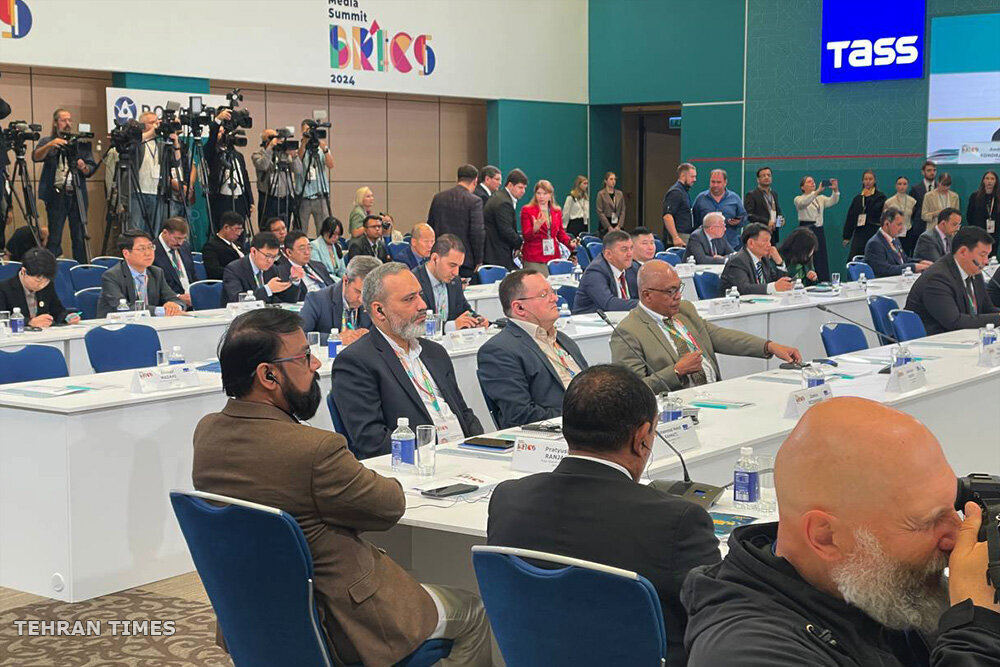The 7th BRICS media summit: a crucial step in strengthening global media collaboration

TEHRAN – The 7th BRICS media summit, currently underway in Moscow, marks a significant moment in the evolving media landscape within the BRICS alliance.
Running from September 13 to 17, the summit has gathered key media representatives from BRICS nations and several other countries interested in enhancing cooperation.
Among the notable participants are representatives from Iranian media outlets such as the Tehran Times, Mehr, and IRNA.
BRICS, originally composed of Brazil, Russia, India, China, and South Africa, is on the cusp of a new era, with significant expansion efforts underway.
During the Johannesburg Summit in August 2023, BRICS extended invitations to Egypt, Iran, the UAE, Saudi Arabia, and Ethiopia, reflecting the mounting interest from nations seeking alternatives to Western-dominated global structures.
With more than 30 membership applications currently under review, as reported by the Russian Foreign Minister, BRICS is emerging as a focal point for countries in the Global South aiming to reshape the international order.
BRICS currently represents approximately 46% of the world's population and accounts for 30% of global GDP. As an intergovernmental association, BRICS has no permanent headquarters or secretariat, yet its influence spans a wide range of sectors, including economic, cultural, scientific, and technical cooperation.
This year's BRICS media summit, co-organized by Russia's TASS news agency, has highlighted the critical role that media cooperation plays within the BRICS vision.
Russian Foreign Minister Sergei Lavrov, in a video address at the summit’s opening, emphasized that BRICS stands as a unique platform for comprehensive cooperation, underpinned by principles of equality, mutual respect, and balanced interests. Lavrov stressed that media organizations in BRICS countries must lead the way in countering biased narratives often seen in Western media.
"The forum's theme— ‘The Role of the BRICS Media Community in Strengthening Stability and Cooperation in Today’s World’—is a reflection of the irreversible shift toward a multipolar world," Lavrov noted.
He underscored the importance of fact-based journalism in ensuring that BRICS audiences receive accurate and reliable information, free from the dominance of Western perspectives.
The summit has brought together influential media figures from BRICS countries, alongside representatives from the Global South and East, providing a platform for exchanging ideas and building professional networks.
Challenges in the global media landscape
One of the most pressing topics discussed at the summit is the growing divide between the media of the Global North and South. BRICS members have long voiced concerns over the monopolization of the global media by Western outlets, which often leads to skewed or incomplete reporting on geopolitical issues.
Iran’s ambassador to Russia, Kazem Jalali, criticized the U.S. media strategy, accusing them of suppressing outlets that challenge their narratives. Jalali cited the example of U.S. allegations against Russia Today (RT), with Secretary of State Antony Blinken accusing the network of meddling in the internal affairs of other nations.
Jalali dismissed such claims, arguing that the U.S. media strategy of undermining independent voices is becoming less effective in a world where the Global South is asserting its own media presence. "The strategy of undermining competing media outlets is no longer effective," Jalali remarked, reflecting a broader sentiment among BRICS nations about the need for independent media voices to challenge Western hegemony.
The Moscow media summit has also featured panel discussions on the role of BRICS media in strengthening stability in a multipolar world, alongside technical discussions on enhancing information exchange between BRICS countries. These conversations aim to bolster media collaboration and ensure that BRICS nations can effectively share their perspectives on global events, free from the influence of dominant Western media outlets.
It is important to note that the ongoing media summit in Moscow serves as a precursor to the upcoming BRICS summit, which is scheduled to be held in Kazan from October 22 to 24, 2024.
This high-profile event will play a crucial role in shaping the future direction of the BRICS alliance, especially in light of its ongoing expansion and increasing global influence. Expert reports on the new membership applications will be presented at the summit, and discussions will focus on fostering global development and security in a balanced and fair manner.
As BRICS continues to grow in both membership and influence, media cooperation will play an increasingly critical role in shaping global narratives. Through platforms like the BRICS media summit, member countries are working to strengthen their media infrastructure, develop new channels for collaboration, and ensure that their stories are heard on the global stage.
